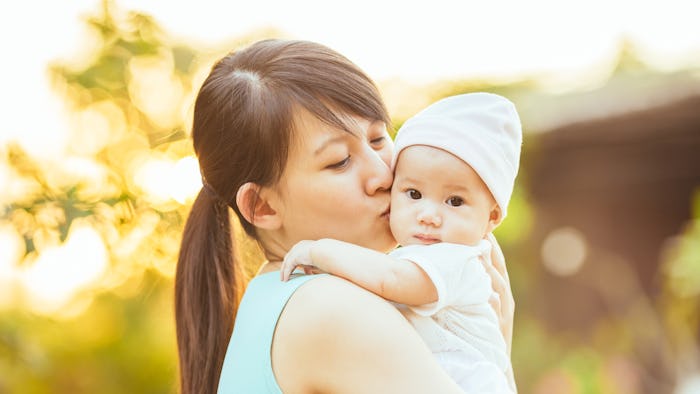Life

This Theory On Why Babies Don't Typically Say "Mama" First Will Make You Sob
The biggest milestone for a lot of parents are baby’s first words, and if your kid lives in a mixed-gendered home, the battle between the baby saying "Mama" or "Dada" first prevails. It’s always been a stiff competition among my friends and their spouses to see which one their baby will call for first, and of course my girlfriends are team “Mama." But it's widely known that a lot of kids ultimately say “Dada” first, and the reasoning has always been that it's an easier sound to make. But this other theory on why babies don’t say Mama first will make you cry — in a good way.
As parents, it's typical to view your child as an extension of yourself. Your heart is living, breathing, and walking outside of your body. But just like you view your children as a part of you, Dr. Catherine Gritchen, a pediatrician at MemorialCare Medical Group in Long Beach, California, tells Romper that your baby feels the same way. And this bond? It might actually be why your kid is more likely to say "dada" before "mama."
"[One] developmental theory is that infants tend to not appreciate mama as an independent person, but rather, a part or extension of themselves," Gritchen says. And now your heart has grown three sizes, right?
Dr. Mayra Mendez, a licensed psychotherapist and program coordinator for intellectual and developmental disabilities and mental health services at Providence Saint John's Child and Family Development Center in Santa Monica, California, explains that the mother-baby bond is pretty simple if the mom is the primary caregiver — your baby is living life through you. “The mother, or the object that is the primary caretaker of the baby, is viewed as an extension of the baby because they are the person that, in the baby’s brain, represents the entity through which the baby experiences self. Attachment and bonding are first founded in the secure relationship the baby has with the mother.” But don’t worry, dads. Mendez says this could also happen with the father if you’re the primary caregiver. It just so happens that in most societies, moms function as the primary caregiver, she adds.
As I was researching this, I thought about my own son. I was previously stoked that he started making the noise “mamamamama” before he said "dada," but now I worried that maybe he wasn’t as bonded to me because he said my name first. (This is how my brain works as a mom with anxiety, ladies and gentlemen.) But apparently I don't need to worry. Mendez says that before 9 to 12 months of age, sounds are nonspecific.
“But quickly by 9 to 12 months, sounds are representative of familiar things and 'dada' will come to have meaning and label for Daddy. But the baby saying 'dada' or 'mama' first is not indicative of bonding and attachment, especially since there is no specific meaning ascribed to the sounds when they first appear in the baby’s language repertoire.”
Whew. Mendez explains, “Language development begins with sound making and babbling. Babies utter the first sounds that are easiest and most available to them. The first consonant sounds are typically 'baba' or 'dada' simply because they are easy sounds to produce." But she says that as early as 6 months, your baby will start to experiment with consonant and vowel sounds, and will start repeating words that are often said to them.
But before you know it, baby will realize the two of you are separate people. According to Mendez, by 24 months of age, "a toddler has integrated an understanding of self and others. The ability to formulate healthy self-concept and confidence is founded in the secure attachment relationship with the caregiver."
I mean, that's all any parent wants, right? So soak up those babbles, no matter which parent they sound like they're calling for — it's all sweet.